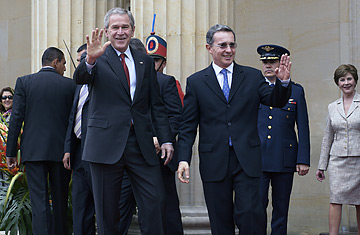
U.S. President George W. Bush meets with Colombian President Alvaro Uribe in Bogota, Colombia, March 11, 2007.
When he left the 20-degree weather in Washington, he was the same old conservative Connecticut Texan the country has come to know. Here in Brazil, where it's the middle of deepest summer, the sub-Equatorial Bush is best friends with President Luiz Inacio da Silva (aka Lula), the leader of Brazil's Worker's Party, and is preparing to butter up Uruguay's first leftist President, Tabare Vazquez.
He looked perfectly at home visiting the massive Petrobras fuel depot, where many of the products are green fuels like ethanol and biodiesel, the production of which he is here to highlight. Liberal critics who have always charged Bush was more plutocrat than compassionate conservative would have been surprised to hear the speech on the region he gave in Washington this week in which he used the phrase "social justice" six times and said America was dedicated to "delivering aid that empowers the poor and the marginalized." Just how far to the rhetorical left has Bush strayed? In the same speech he declared that North and South Americans are all "sons and daughters" in a "struggle" to "complete the revolution" started by Washington and Bolivar.
If Bush is starting to sound more like a 1980s campus radical than a 21st century Republican there are good reasons. Bush's newfound rhetoric is calculated for the task at hand: countering the rising influence of Venezuela's Hugo Chavez, an expert rabble-rouser and rhetorical pot-stirrer who has taken up Castro's mantle as Latin America's most popular anti-American leftist. Chavez is traveling to Argentina for an anti-Bush rally timed to coincide with the U.S. President's trip, and has been lavishing the region with some of the tens of billions Venezuela brings in each year in oil revenues.
As Secretary of State Condoleezza Rice inked a bio-fuel technology-sharing agreement with the Brazilian foreign minister Friday morning and Bush toured the Petrobras facility, protesters managed to float an anti-Bush balloon a half-mile away. Before Bush arrived Thursday, riot police clashed with an estimated 6,000 protesters in Sao Paolo's financial district.
Though Bush is studiously declining to talk about Chavez, the U.S. knows it faces in him a "competing vision of development in the Americas" based on "centralized commodity-based economies" and "authoritarian political leadership," according to Assistant Secretary of State Thomas Shannon. "The U.S. suddenly finds itself outmaneuvered in real terms," says Harvard Latin America expert Prof. Kenneth Maxwell. Chavez, he says, has real money and is doing clever things his more ham-fisted populist predecessors wouldn't have thought of, like buying debt in Argentina. "The U.S. has never had competition like that," says Maxwell.
So don't expect Bush's newfangled left-of-center message, which he is backing up with pledges of aid, to stop in the southern cone. By the time Bush arrives in central America early next week, he'll be visiting a Guatemalan cooperative — yes, cooperative — farm. Whether or not any of this will be enough to check Chavez's influence is an open question. But even Democrats are praising Bush's new approach. "Bush is right to try and refocus attention like this," says a senior Democratic Senate staffer. "It's welcome."
